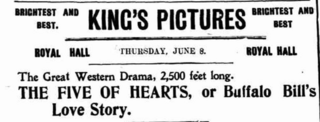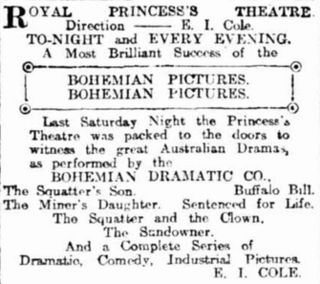
John F. Gavin was a pioneer Australian film actor and director, one of the early filmmakers of the 1910s. He is best known for making films about bushrangers such as Captain Thunderbolt, Captain Moonlite, Ben Hall and Frank Gardiner. Known informally as 'Jack', Gavin worked in collaboration with his wife Agnes, who scripted many of his films.

Laggan is a small village on the traditional land of the Gundungurra people in the Southern Tablelands, New South Wales, Australia in Upper Lachlan Shire. At the 2016 census, Laggan had a population of 358.

The Assigned Servant is a 1911 Australian silent film about a convict who is transported to Van Diemen's Land. It was made by the husband-and-wife team of John and Agnes Gavin and is considered a lost film.
Sweet Nell of Old Drury is a 1911 Australian silent film directed by Raymond Longford starring Nellie Stewart about the relationship between Nell Gwynne and King Charles II. It is based on the 1900 play of the same name by Paul Kester which Stewart had performed numerous times on stage. It is considered a lost film.

Alfred Rolfe, real name Alfred Roker, was an Australian stage and film director and actor, best known for being the son-in-law of the celebrated actor-manager Alfred Dampier, with whom he appeared frequently on stage, and for his prolific output as a director during Australia's silent era, including Captain Midnight, the Bush King (1911), Captain Starlight, or Gentleman of the Road (1911) and The Hero of the Dardanelles (1915). Only one of his films as director survives today.

For the Term of His Natural Life is a 1908 Australian silent film based on the 1874 novel by the same name by Marcus Clarke. The film is an adaptation of MacMahon's stage adaptation of the novel.
Captain Starlight, or Gentleman of the Road is a 1911 Australian silent film about the bushranger Captain Starlight. It was based on Alfred Dampier's stage adaptation of the 1888 novel Robbery Under Arms. It is considered a lost film.

The Lady Outlaw is a 1911 Australian silent film set in Van Diemen's Land during convict days.
The Cup Winner is a 1911 Australian silent film directed by Alfred Rolfe. It is set against a backdrop of horseracing and the finale involves real footage from the 1911 Melbourne Cup.
Won on the Post is a 1912 Australian silent film directed by Alfred Rolfe set against a backdrop of horseracing.
Around the Boree Log is a 1925 Australian silent film by Phil K. Walsh adapted from the poems of "John O'Brien". It tells stories of a priest's life around the 1870s in the Goulburn area.

Bushranger's Ransom, or A Ride for Life was an Australian silent film produced by Pathé Frères' in 1911, their first motion picture production in Australia after establishing a branch office in Sydney in April 1910. It was adapted from a stage play first performed in 1907 by E. I. Cole's Bohemian Dramatic Company.

The Squatter's Son is an Australian film completed in 1911 and directed by E. I. Cole. It was based on a play which Cole and his company had performed throughout Australia.

The Five of Hearts, or Buffalo Bill's Love Story is a 1911 Australian film from Edward Irham Cole based on a stage play about Buffalo Bill which Cole had performed extensively. It is also known as A Maiden's Distress or Buffalo Bill. It was reportedly the longest of Cole's films.

Sentenced for Life is an Australian film directed by E. I. Cole. It was an adaptation of a play performed by Cole and his Bohemian Dramatic Company as early as 1904.

The Taralga Echo was a weekly English-language newspaper published in Crookwell, New South Wales from 1924 to 1927.

Mates from the Murrumbidgee is a 1911 Australian silent movie. It is considered a lost film and was arguably the first Australian war film, being set during the Boer War.

Edward Irham Cole was an Australian theatrical entrepreneur and film director whose productions represented a synthesis of Wild West show and stage melodrama. He managed a theatre company, called the Bohemian Dramatic Company, that performed in semi-permanent and temporary tent theatres. During 1910 and 1911 Cole directed a number of silent films, adapted from his stage plays and using actors from his theatre company.

The Squatter and the Clown is a 1911 Australian silent film. It was one of a series of films made by Edward Irham Cole's Bohemian Dramatic Company.

Alpine Lodge Motel is a heritage-listed former group of terrace houses and now motel at 244–248 Sloane Street, Goulburn, Goulburn Mulwaree Council, New South Wales, Australia. It was added to the New South Wales State Heritage Register on 2 April 1999.















